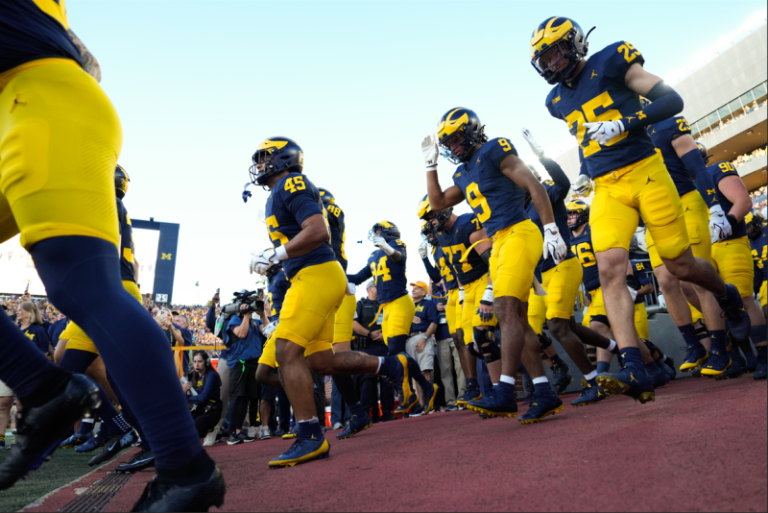The Big Ten is considering a $2.4 billion private equity investment, which has caused a dispute within the conference.
A University of Michigan regent has suggested the school could consider football independence if the deal proceeds without unanimous approval.
Michigan and USC have objected to the proposal, citing concerns over conference autonomy and payout structures.
Could Michigan football leave the Big Ten? At least one member of the Board of Regents isn’t ruling it out.
The conference, led by commissioner Tony Petitti, is in discussions on a $2.4 billion investment from private equity firm UC Investments — the University of California system’s portfolio manager — and create a standalone company called Big Ten Enterprises.
On Monday, however, UC Investments announced it would wait for ‘unity of the 18 Big Ten university members’ before proceeding.
Likewise, Acker spoke Monday with NBC Sports’ Nicole Auerbach, on SiriusXM’s ‘College Sports’ show, and drew an even harder line stance: If the Big Ten does agree to this without unanimous approval of all 18 member institutions, the Wolverines would consider going independent when the current media rights deal expires in 2036.
‘Michigan has a lot of options,’ Acker said. ‘The possibility of independence for football is certainly something that has to be considered. Not today, but at the end of the grant of rights. I think it’s something you have to think about, not because we want to leave the Big Ten conference, because the commissioner’s office has made it enormously clear that they’re going (to move forward with the proposed capital deal) without us.
‘That would be the end of Michigan, as far as I can see, in the Big Ten conference.’
As part of the proposed deal, UC Investments would earn 10% of the Big Ten’s media and sponsorship rights earnings for 15 years, after which it could sell its stake. The remaining 90% would be divided among the schools, with payouts varying based on a university’s earning potential.
When news of the pending deal broke last month, Michigan and USC were the two institutions to object. The other 16 teams in the conference all have seemingly agreed on the deal. Not only because athletics costs are rising — especially since a court settlement allows NCAA schools to pay players directly — but because the immediate influx of cash would theoretically help all programs become more competitive in the short term in the NIL era.
Michigan doesn’t want to accept it, it appears, because the school is well-positioned and well-endowed. Furthermore, it does not want the conference to sacrifice its autonomy to an outside investor.
USC’s main issue seems to stem from its position outside the top tier of member institutions (in part based on longevity in the league, having only joined the Big Ten in 2024) and therefore wouldn’t receive the same cut as programs such as Michigan and Ohio State.
The deal would extend the Big Ten’s Grant of Rights by a decade, through 2046. Some in the conference see that as a good thing, with the hopes for for long-term stability and an assurance the league would not turn into a super-conference.
Those in Ann Arbor see it differently.
‘As (Bernstein) said a few days ago, signing the … extension 21 years down the line is a pretty big thing to do when you don’t know what college football is going to look like four or five years from now,’ Acker said. ‘I think taking independence off the table would be silly. I think taking any other option that might come to us over the next few years off the table would be silly.
‘It would be, frankly, irresponsible of us as fiduciaries to the University of Michigan to sign off on something that binds us when we don’t know what that binding is going to look like.’
Last week, nearly two dozen board members from 12 Big Ten universities had a call with officials from the American Council of Trustees & Alumni, per Yahoo Sports’ Ross Dellenger. On the call, U-M regent Sarah Hubbard said it was about a ‘fundamental’ question: ‘Is it appropriate for an outside investor to be doing this with the Big Ten?
‘Still seeking answers here on the B1G proposal,’ she posted on X on Monday.

